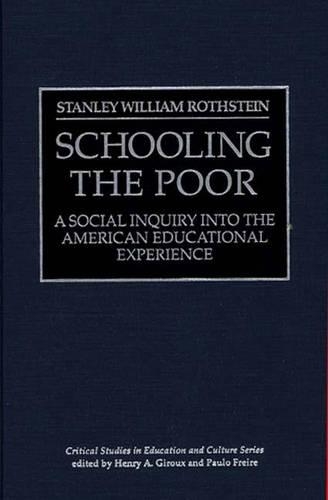
Schooling the Poor: A Social Inquiry into the American Educational Experience
(Hardback)
Publishing Details
Schooling the Poor: A Social Inquiry into the American Educational Experience
By (Author) Stanley William Rothstein
Bloomsbury Publishing PLC
Praeger Publishers Inc
22nd June 1994
United States
Classifications
Tertiary Education
Non Fiction
Teaching of students with different educational needs
Poverty and precarity
Social and cultural history
370.973
Physical Properties
Hardback
208
Description
By combining history with sociology, Rothstein presents a new way of looking at state-supported schools. He describes the pauper schools of the early 1800s and shows how they became the foundation for the common schools that followed. Compulsory education sought to alleviate urban crime while assimilating the immigrants who flocked to our shores in each generation. In the late 19th century, the militaristic schools became more bureaucratic and set in their ways in spite of the new thinking in education represented by John Dewey. Rothstein shows how Dewey was taught in college but that Thorndike was followed in the public schools. The high school was an attempt to meet the changing needs of the Industrial Revolution. After recapitulating the foundational history of American public schools, Rothstein examines the psychological effects of martinet teaching methods on students' self-perception and performance. A stunning new (old) perspective on American education.
Author Bio
STANLEY WILLIAM ROTHSTEIN is Professor of Education and Social Foundations at California State University, Fullerton. He is the author of Identity and Ideology (Greenwood, 1991), The Voice of the Other (Praeger, 1992), and Handbook of Schooling in Urban America (Greenwood, 1993).
